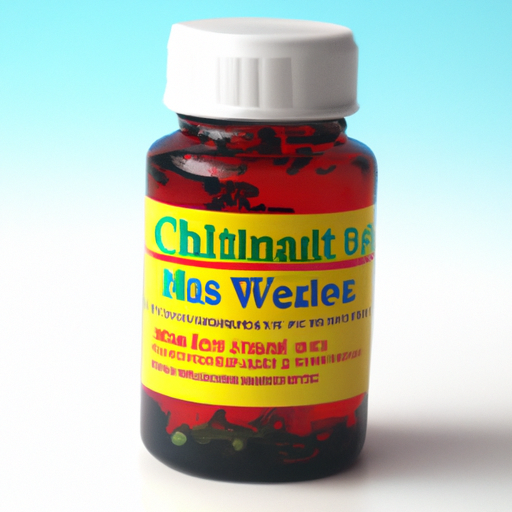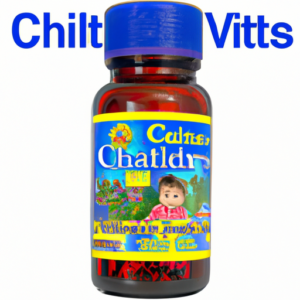In this article, we will explore whether it is safe and beneficial for children to take health supplements. We will look at the different types of supplements available and discuss the potential risks and benefits of their use in kids. Additionally, we will provide some guidelines to help parents make informed decisions regarding their child’s supplement intake. So, if you’re curious about whether children can take health supplements, keep reading to find out all you need to know.
Reasons children may need health supplements
Nutritional deficiencies in children
Children may sometimes have nutritional deficiencies due to various reasons such as inadequate intake of certain nutrients from their diet or an inability to absorb nutrients properly. In some cases, children may have a restricted diet due to allergies or food intolerances, which can result in deficiencies. Health supplements can help fulfill these nutrient gaps and ensure that children receive the necessary vitamins and minerals for their growth and development.
Growing bodies and increased nutritional needs
Children go through significant growth spurts, particularly during infancy and adolescence. These growth periods require increased nutritional support to support the development of bones, muscles, and overall organ function. Health supplements can provide additional nutrients that may be challenging to obtain solely through diet, contributing to the overall health and well-being of growing children.
Picky eating and limited diets
Many children are picky eaters or have limited diets due to taste preferences, sensory issues, or other factors. This can result in a lack of variety in their diet, potentially leading to nutritional deficiencies. Health supplements can be a useful tool in ensuring that children still receive the necessary nutrients, even if they are not obtaining them through food. However, it is important to note that supplements should not replace a balanced diet, but rather complement it.
Types of health supplements for children
Multivitamins
Multivitamins are a common type of health supplement for children. They typically provide a range of vitamins and minerals in one convenient dosage. Multivitamins can help fill nutrient gaps in a child’s diet, ensuring they receive adequate amounts of essential nutrients. It is essential to choose a multivitamin specifically formulated for children and follow the recommended dosage guidelines.
Omega-3 fatty acids
Omega-3 fatty acids, such as EPA (eicosapentaenoic acid) and DHA (docosahexaenoic acid), are crucial for brain development and function. These fatty acids are found in fatty fish like salmon and mackerel. However, children who do not consume enough fish or have special dietary restrictions might benefit from omega-3 supplements derived from fish oil or algae. Omega-3 supplements can support cognitive development, promote a healthy heart, and contribute to overall well-being.
Probiotics
Probiotics are beneficial bacteria that support digestive health and strengthen the immune system. They can help balance the gut microbiota, which is important for maintaining a healthy immune system and preventing certain digestive issues. Probiotic supplements for children are available in various forms, including chewable tablets, gummies, and powders that can be added to food or drinks. Probiotics can be particularly beneficial for children who have experienced gastrointestinal disturbances or frequent infections.

Safety considerations for children taking supplements
Consulting with a pediatrician
Before starting any health supplements for children, it is crucial to consult with a pediatrician or healthcare professional. They can evaluate the child’s specific needs, assess potential risks or interactions with medications, and provide personalized recommendations. A healthcare professional can also guide parents in selecting the most suitable and reputable brands for their children.
Ensuring appropriate dosages
Children have specific nutritional requirements based on their age, weight, and overall health. It is important to follow age-specific dosage recommendations provided on the supplement packaging or by healthcare professionals. Giving children excessive amounts of certain nutrients can be harmful, so it is essential to adhere to recommended dosages and not exceed them unless advised by a healthcare professional.
Avoiding potential interactions with medications
Some health supplements may interact with medications a child is already taking. It is important to inform the pediatrician about any medications the child is on before starting any supplements. The healthcare professional can assess potential interactions and suggest alternative supplements or adjust medication dosages if necessary.
Potential benefits of health supplements for children
Improved immune system function
Supplements containing vitamins like vitamin C and zinc can support a child’s immune system, helping them fight off infections and illnesses. Adequate nutrient intake plays a vital role in the proper functioning of the immune system, and health supplements can provide additional support in bolstering a child’s immune response.
Enhanced cognitive development
Certain nutrients, such as omega-3 fatty acids and iron, are crucial for brain development and cognitive function in children. Health supplements containing these nutrients can support memory, focus, and overall cognitive development. However, it is important to note that a balanced diet remains the cornerstone of cognitive development, and supplements should be used in conjunction with a healthy eating plan.
Better bone health
Calcium, vitamin D, and other essential minerals are crucial for developing strong and healthy bones. Health supplements containing these nutrients can support proper bone growth and reduce the risk of conditions like rickets or osteoporosis later in life. Ensuring adequate calcium and vitamin D intake during childhood is essential to lay the foundation for lifelong bone health.

Potential risks of health supplements for children
Allergic reactions
Children may be allergic to certain supplements or ingredients within them. It is important to carefully read labels and ingredient lists to ensure that the child does not have a known allergy or sensitivity to any of the components in the supplement. If any adverse reactions occur after starting a supplement, it is essential to discontinue use and consult a healthcare professional.
Toxicity from excessive doses
While some nutrients are essential for health, excessive doses can be harmful. Giving children excessive amounts of certain vitamins or minerals, such as vitamin A or iron, can lead to toxicity. It is crucial to follow recommended dosages and consult a healthcare professional for guidance on appropriate nutrient intake for children.
Negative interactions with medications
Certain supplements may interact with medications a child is taking, potentially reducing the effectiveness of the medication or causing adverse effects. It is important to inform the pediatrician about any supplements the child is taking to ensure that there are no potential interactions.
Recommended guidelines for giving health supplements to children
Following age-specific recommendations
Different age groups have different nutritional needs. It is important to select supplements formulated specifically for the child’s age group and follow the recommended dosage guidelines provided on the packaging. Age-specific formulations ensure that children receive the appropriate levels of nutrients based on their developmental stage.
Using reputable brands
When choosing health supplements for children, it is crucial to opt for reputable brands that undergo rigorous testing for quality and safety. Researching brands and reading reviews from trusted sources can help ensure that the supplements are of high quality and meet regulatory standards.
Reading labels and ingredient lists
Before giving any health supplement to a child, carefully read the labels and ingredient lists. Pay attention to allergen warnings and check for any ingredients the child may be allergic to. If in doubt, consult a healthcare professional or pharmacist for guidance.
Factors to consider before giving health supplements to children
Individual nutritional needs
Every child is unique, and their nutritional needs may vary based on factors such as age, sex, and overall health. Before giving health supplements to children, it is important to consider their individual nutritional needs and consult a healthcare professional for personalized advice.
Existing health conditions
Children with specific health conditions may require additional supplementation or have restrictions on certain types of supplements. For example, children with kidney problems may need to avoid excessive vitamin C or D intake. It is crucial to inform healthcare professionals about any existing health conditions before starting supplements.
Other sources of essential nutrients
While health supplements can be beneficial, they should not be a substitute for a well-rounded diet. It is important to ensure that children are receiving a varied and balanced diet that includes nutrient-rich foods. Incorporating whole grains, fruits, vegetables, lean proteins, and dairy products can help children meet their nutritional needs without relying solely on supplements.
Alternative ways to address children’s nutritional needs
Encouraging a balanced diet
Promoting a balanced diet is the first step in ensuring children receive the necessary nutrients for their overall health. Encourage children to eat a variety of fruits, vegetables, whole grains, lean proteins, and dairy products. Involving children in meal planning and preparation can also help increase their interest in trying new foods and expanding their palate.
Incorporating nutrient-rich foods
Including nutrient-dense foods in children’s diets can help meet their nutritional needs without relying solely on supplements. Foods such as dark leafy greens, berries, fish, nuts and seeds, and dairy products are excellent sources of essential vitamins and minerals.
Promoting healthy eating habits
Teaching children about the importance of healthy eating habits can have a lasting impact on their overall well-being. Encourage regular family meals, limit processed foods, and promote mindful eating practices. Creating a positive food environment can help children develop a healthy relationship with food and make nutritious choices.
Expert opinions and research on children’s health supplements
Evidence-based studies on effectiveness
Numerous studies have examined the effectiveness of various health supplements for children. Research shows that certain supplements, such as iron for preventing anemia or omega-3 fatty acids for cognitive development, can have positive effects when used appropriately. However, it is important to note that supplements should not replace a balanced diet but rather complement it.
Professional recommendations and guidelines
Health organizations and professional bodies provide guidelines and recommendations regarding children’s health supplements. These guidelines incorporate current scientific research and expert opinions to ensure the safety and efficacy of supplement use in children. Consulting reputable sources can help parents make informed decisions about supplement use.
Ongoing research and updates
Research in the field of children’s health supplements is continually evolving. Ongoing studies aim to further explore the benefits and risks of supplement use in children, providing valuable insights for healthcare professionals and parents. Staying updated on the latest research findings can help inform decisions regarding the use of health supplements for children.
Conclusion
When considering whether children can take health supplements, it is important to weigh the potential benefits against the risks. Health supplements can be a useful tool in addressing nutritional deficiencies and supporting children’s overall health. However, it is crucial to approach supplement use on an individualized basis, considering factors such as nutritional needs, existing health conditions, and other sources of essential nutrients.
Consulting with healthcare professionals, following recommended guidelines, and using reputable brands can help ensure the safe and effective use of health supplements for children. It is also important to remember that while supplements can be beneficial, they should not replace a balanced diet. Encouraging healthy eating habits, incorporating nutrient-rich foods, and promoting a well-rounded diet remain key factors in supporting children’s nutritional needs.
By staying informed about expert opinions, evidence-based research, and ongoing updates in the field, parents can make informed decisions regarding supplement use for their children.

